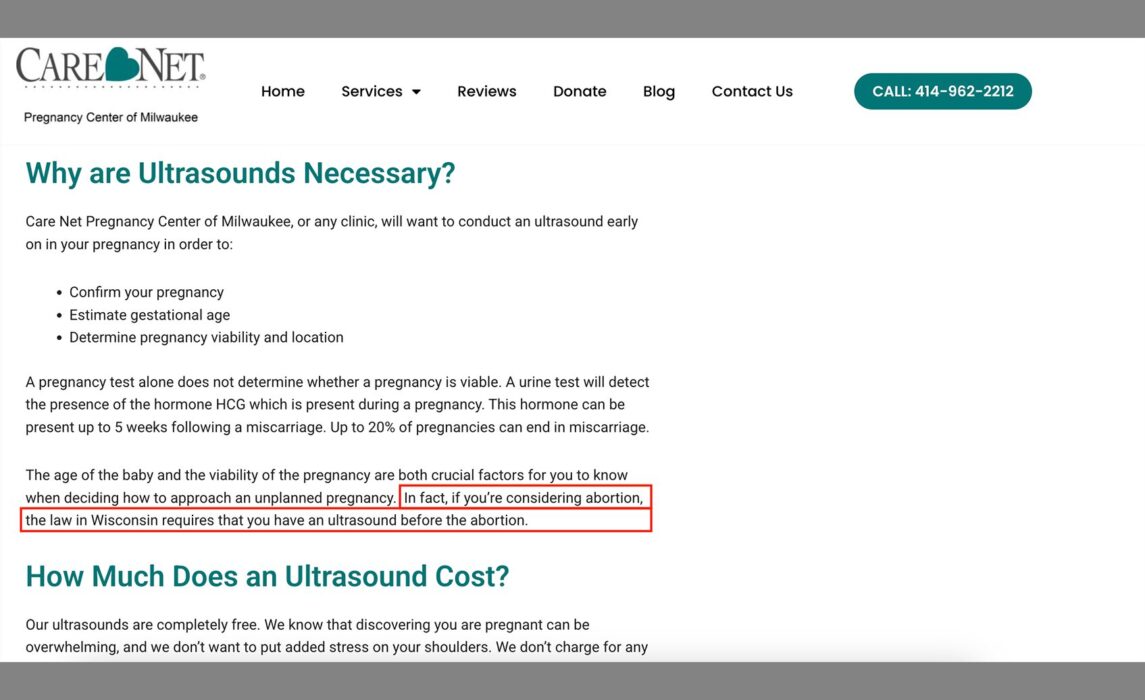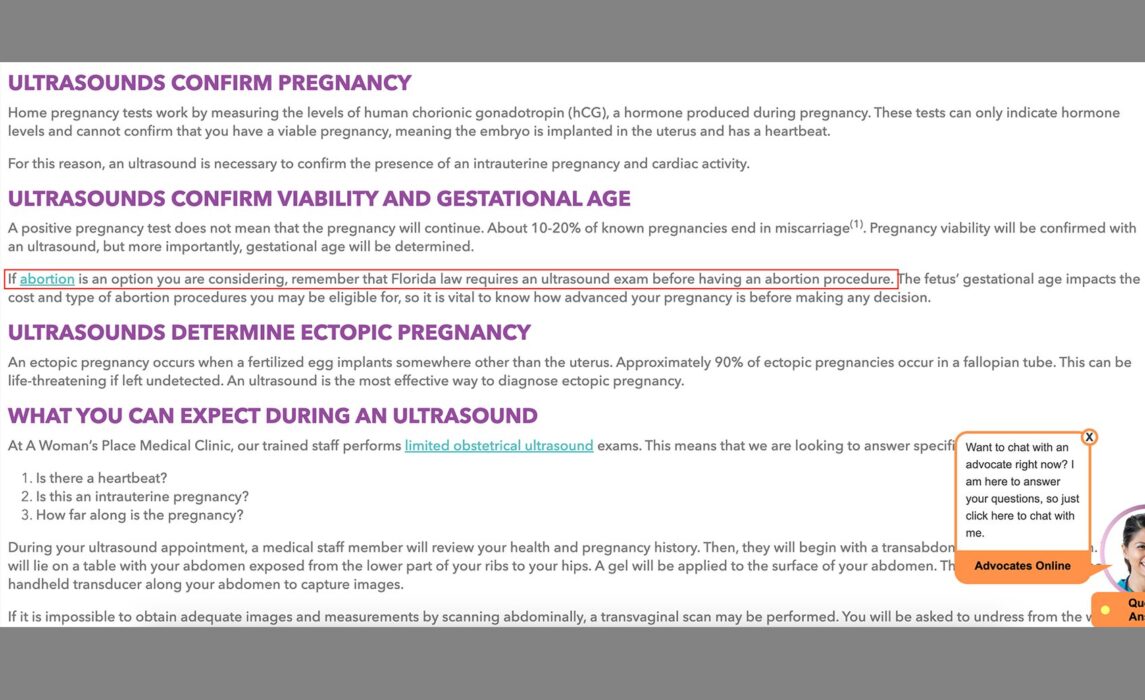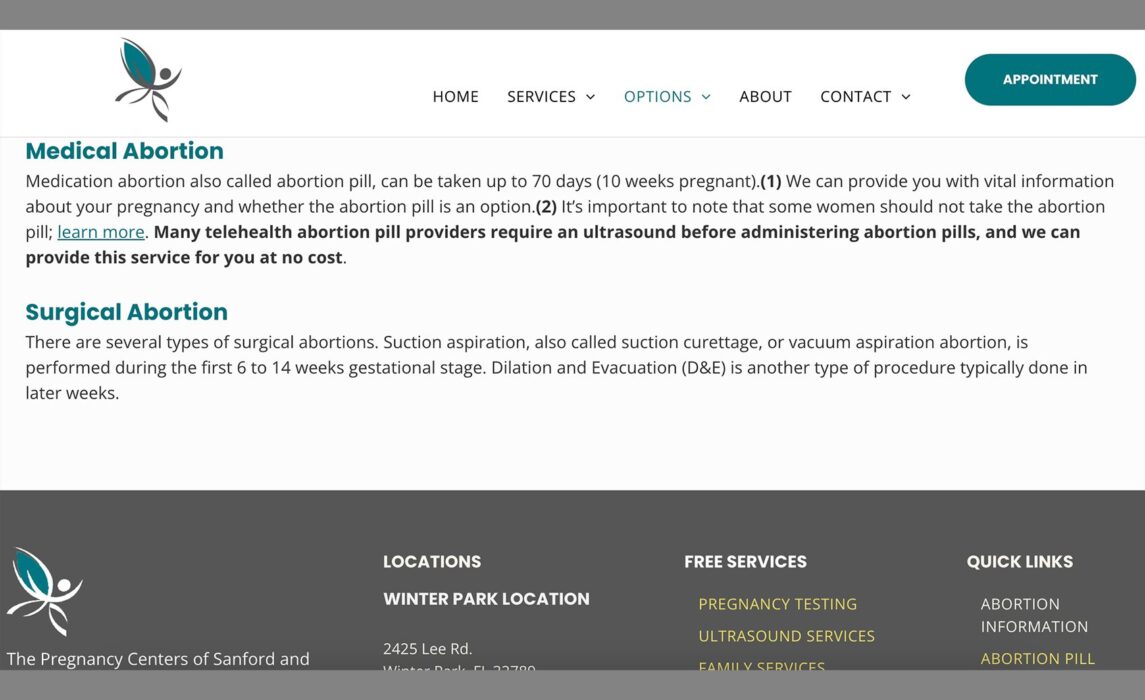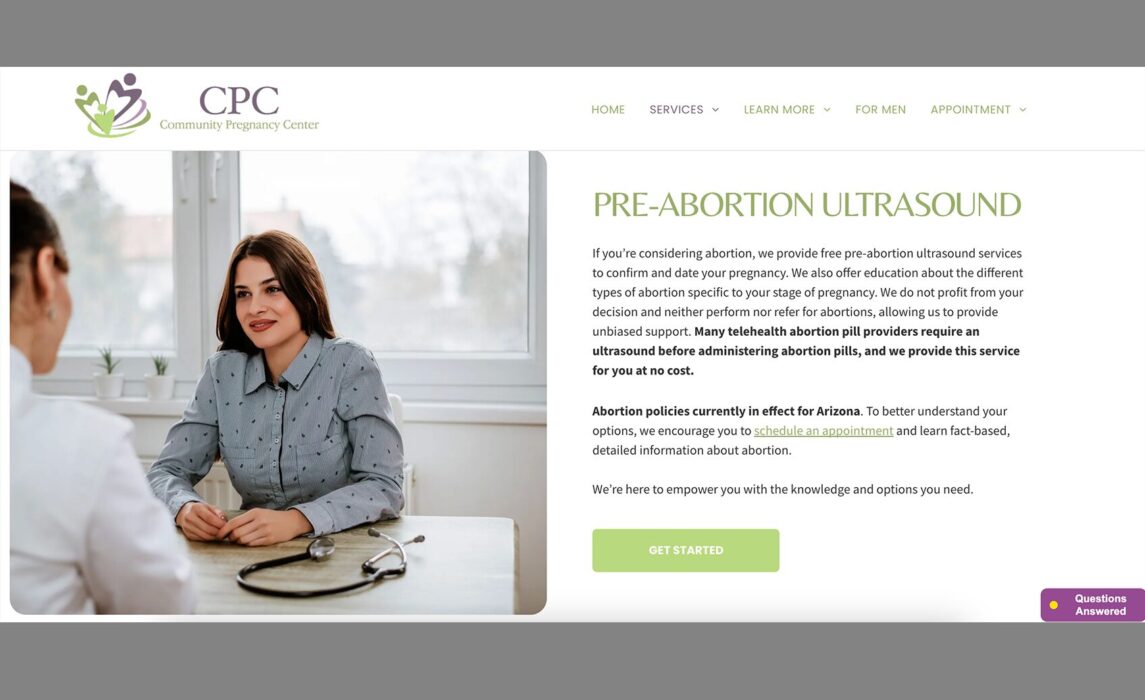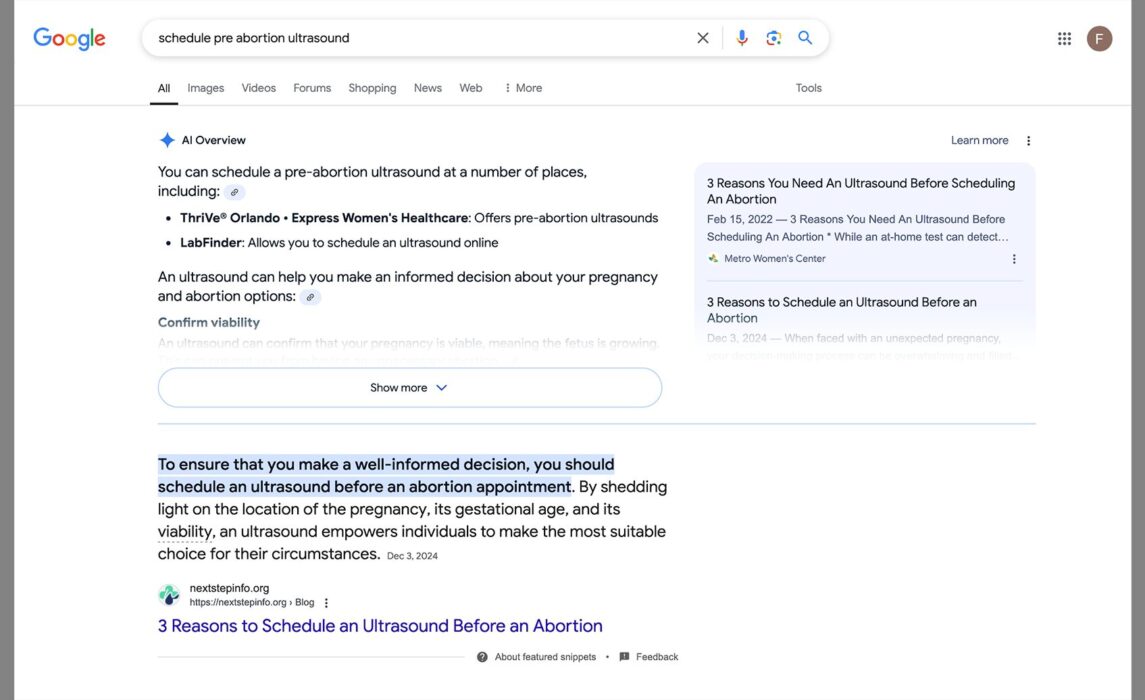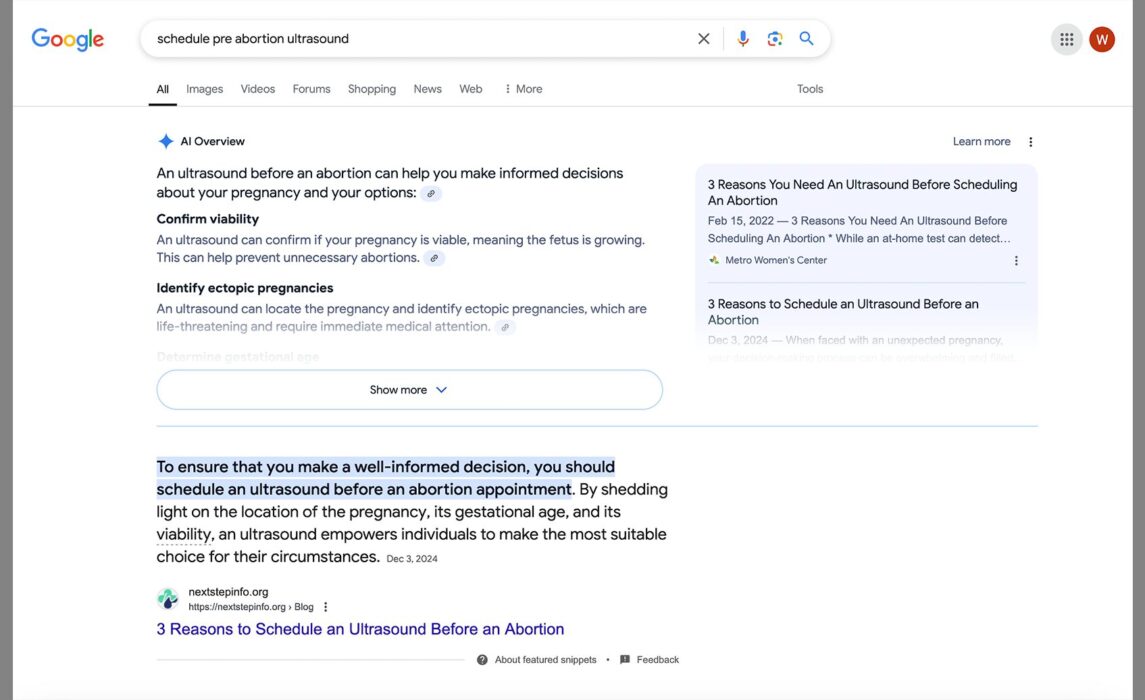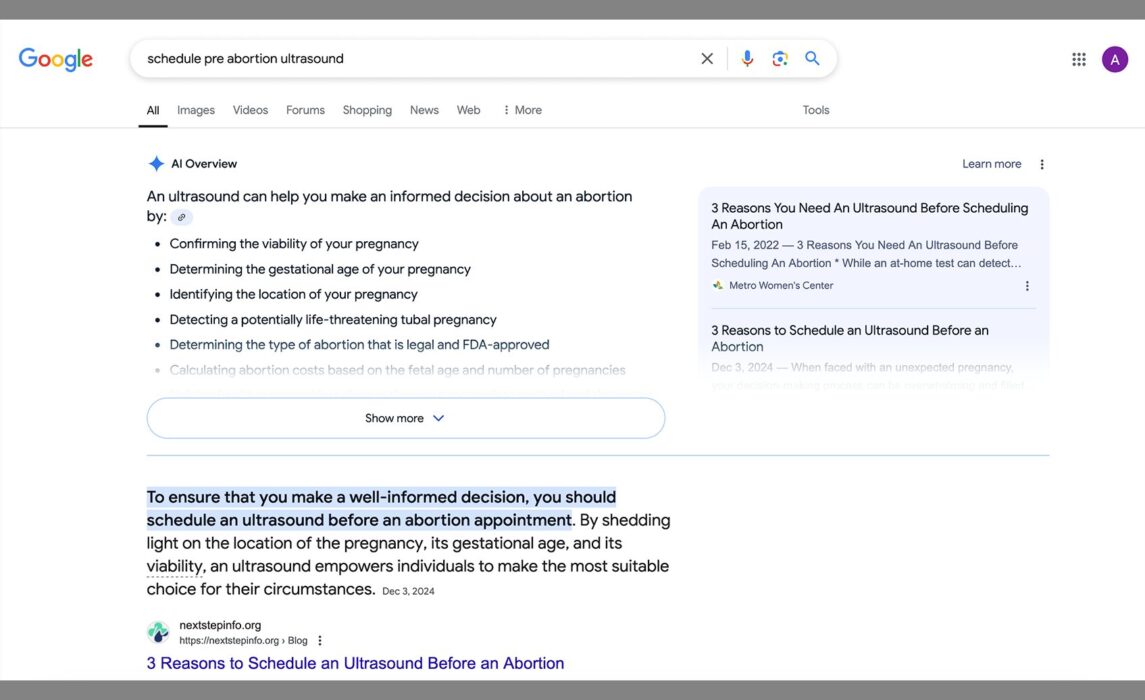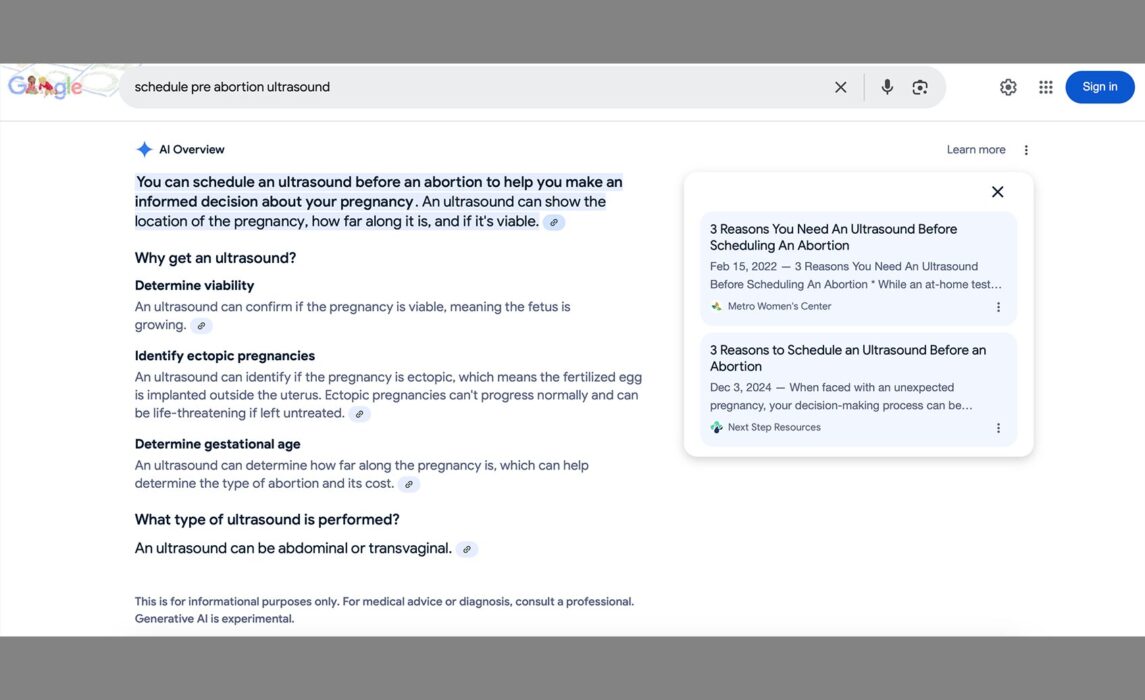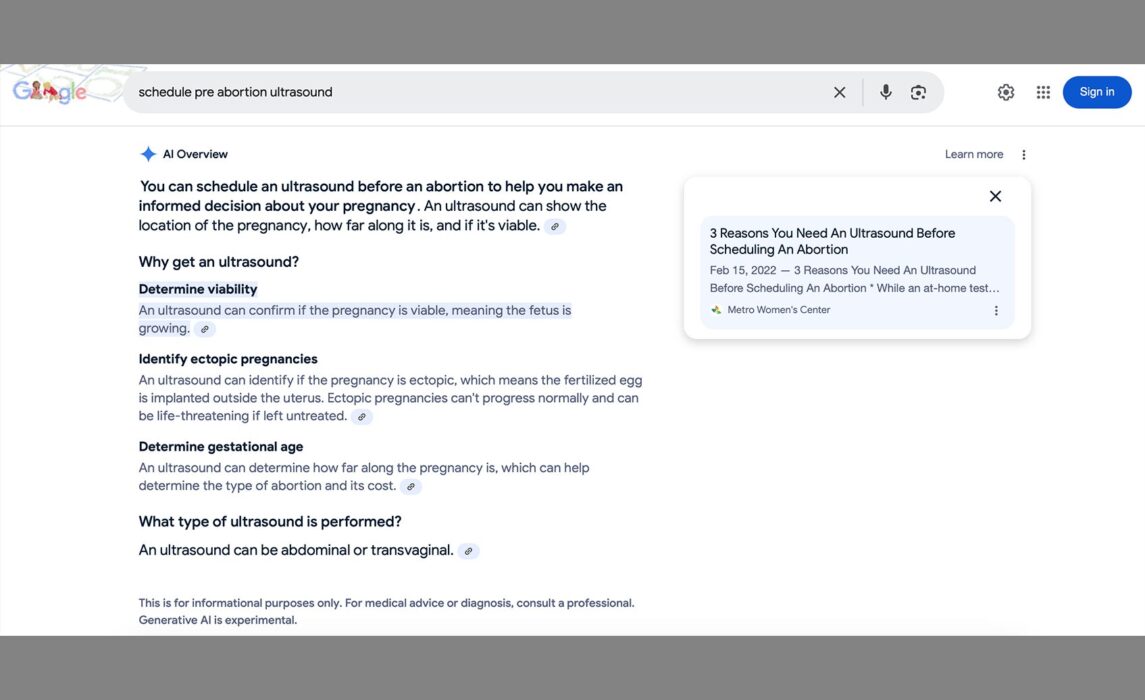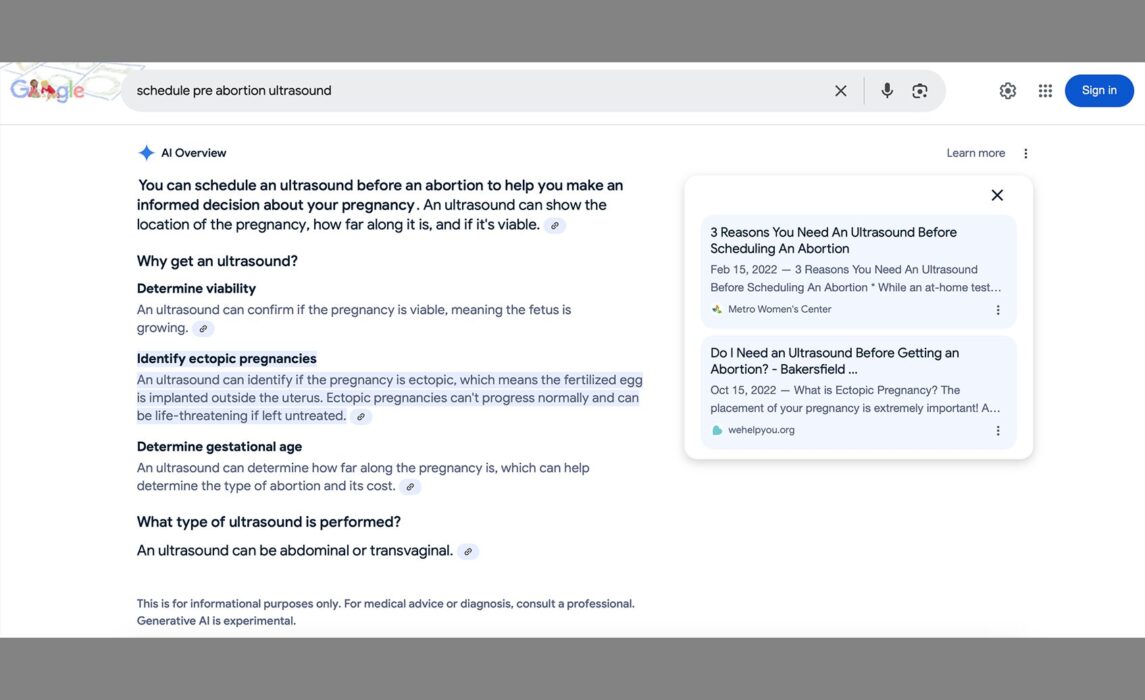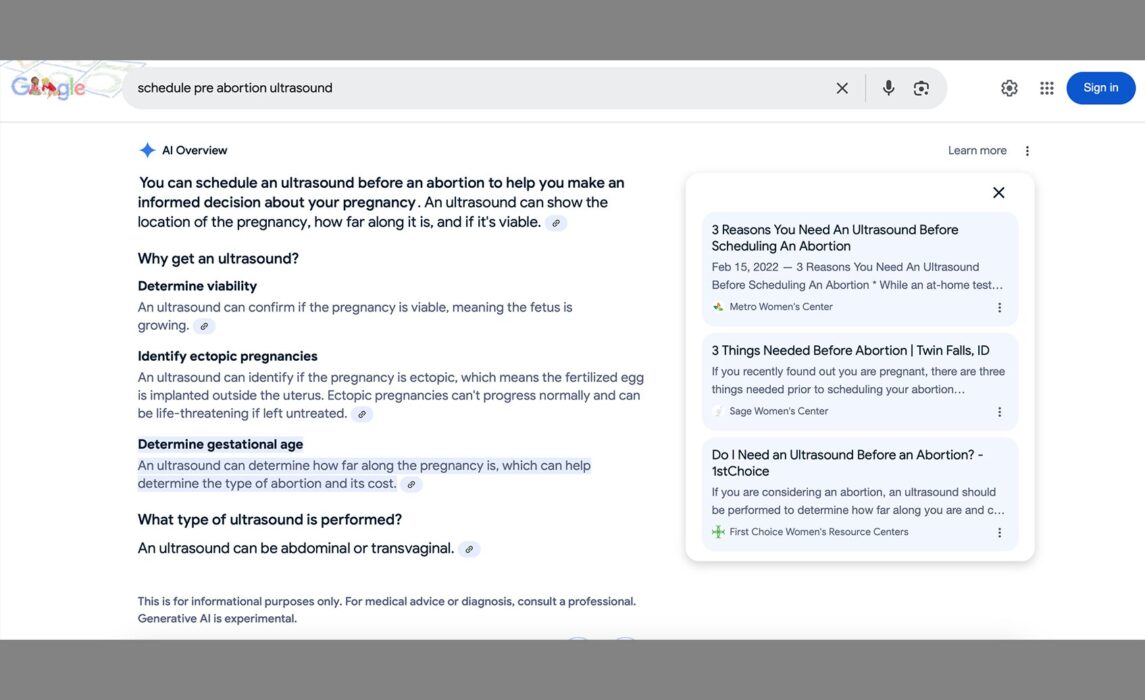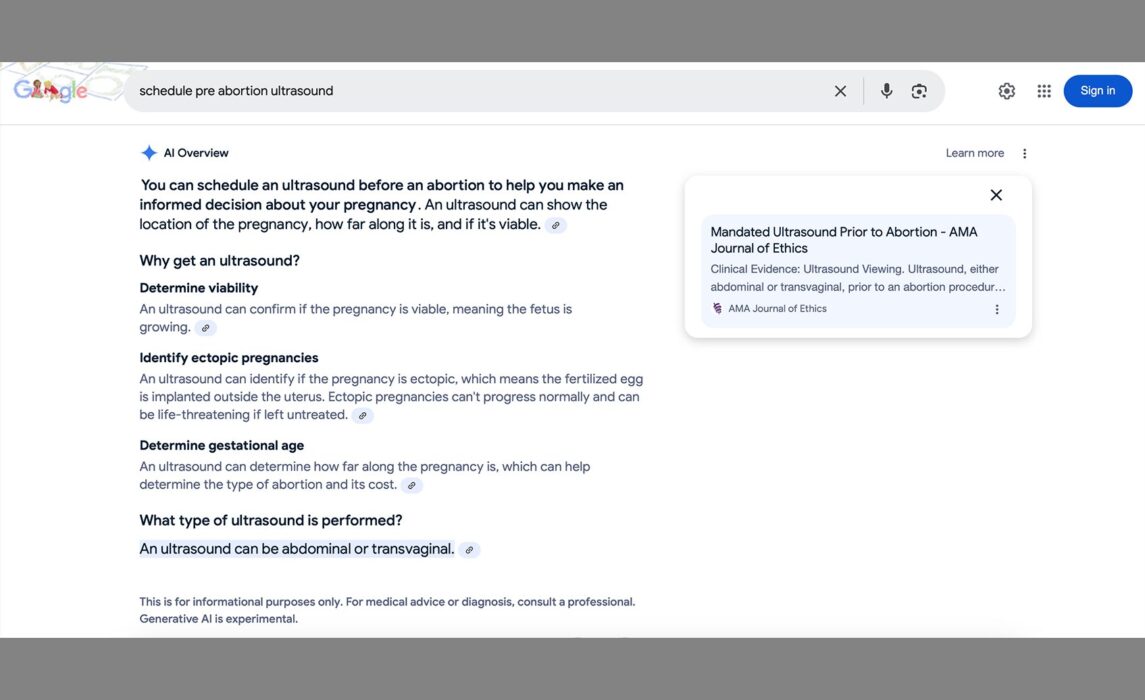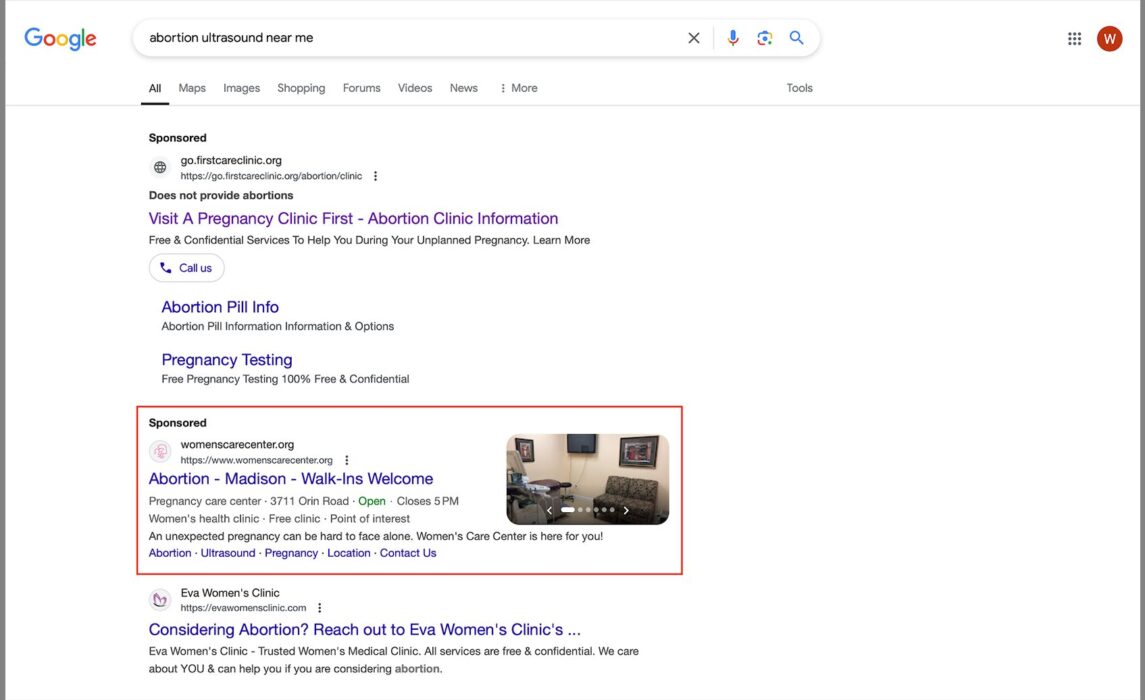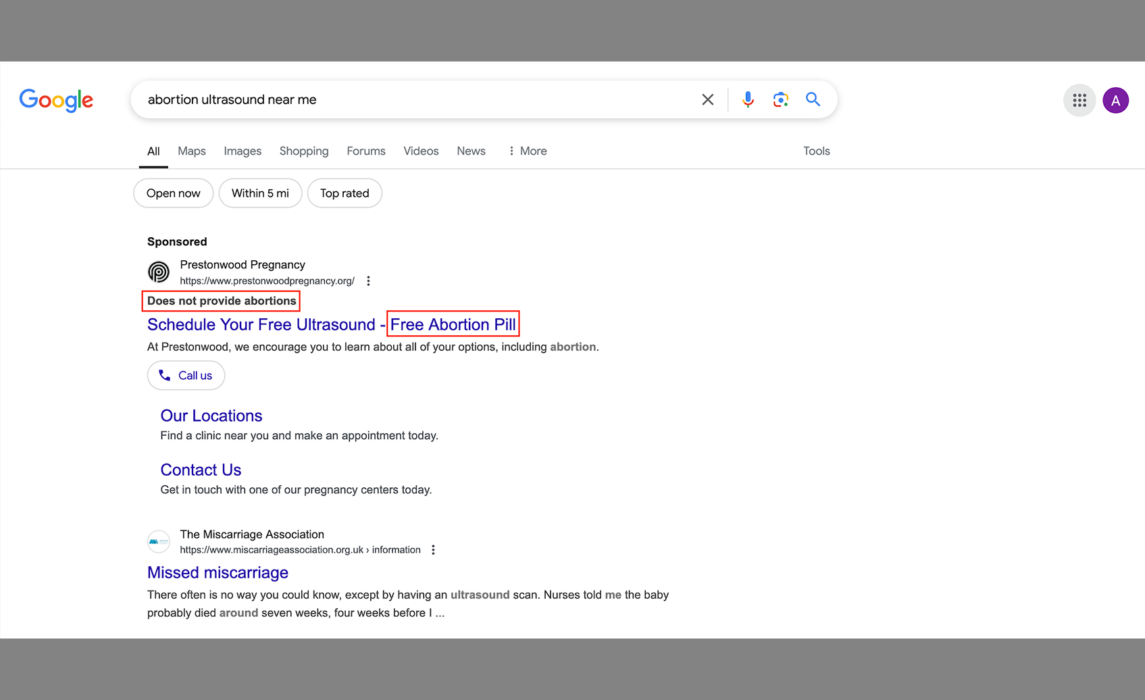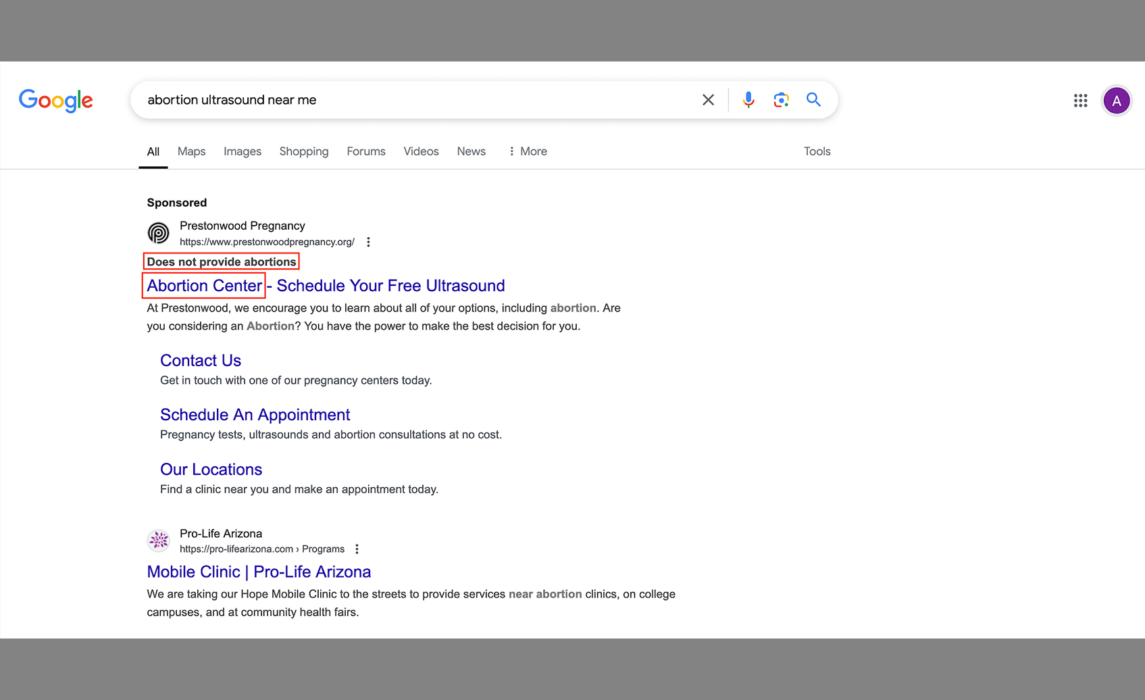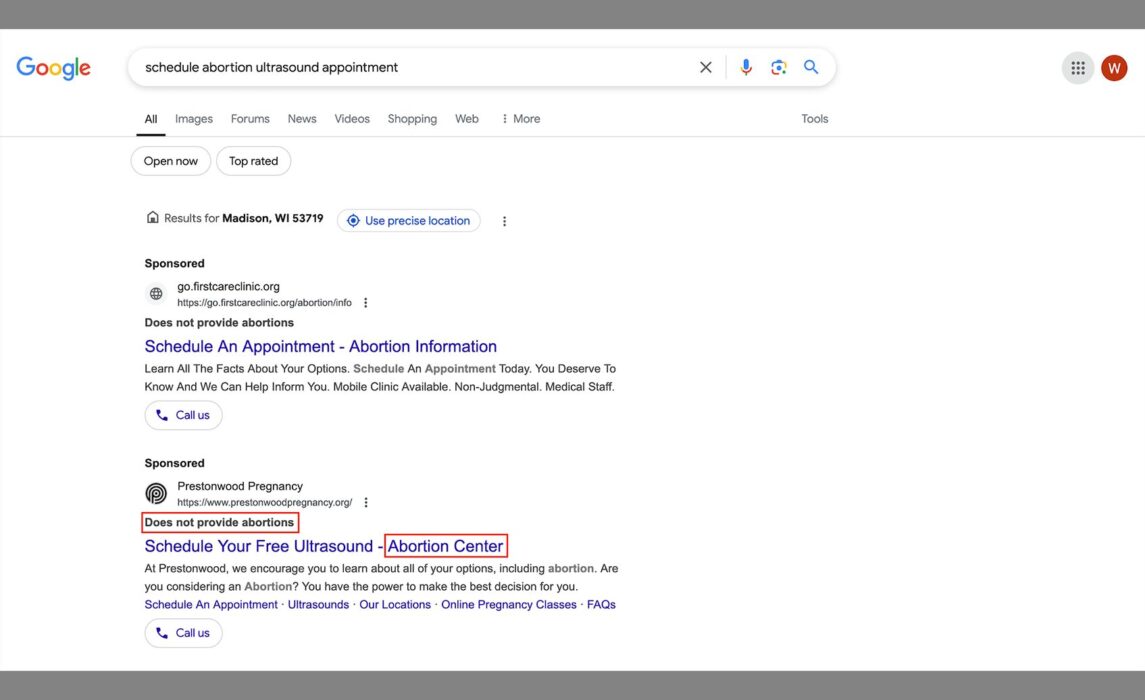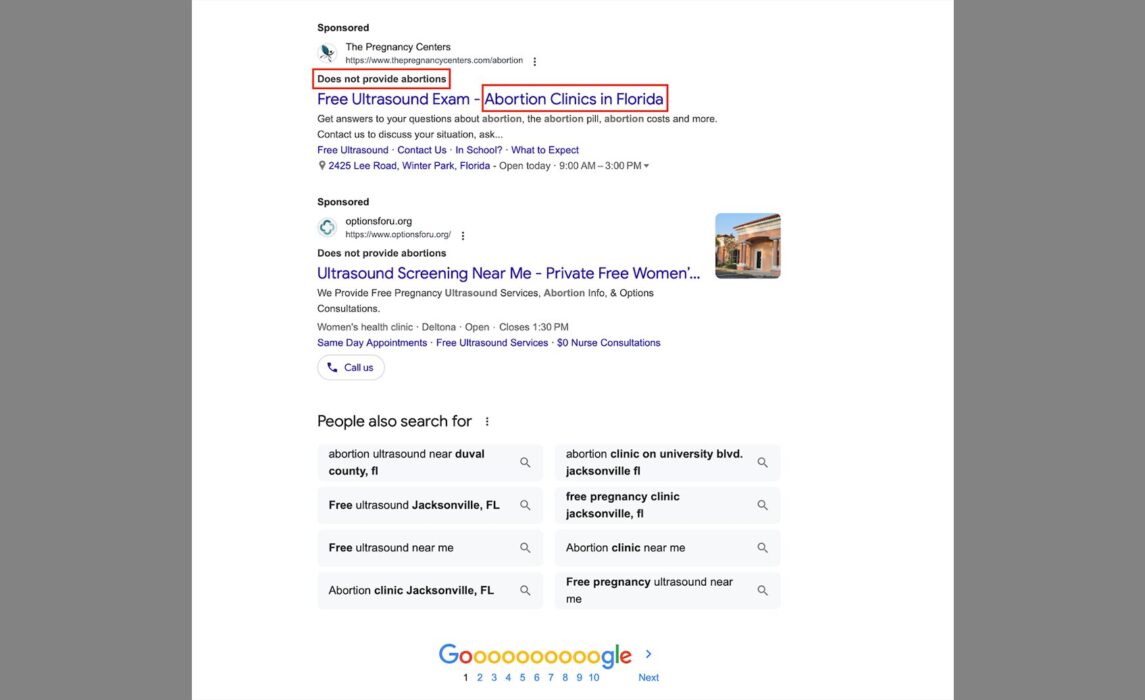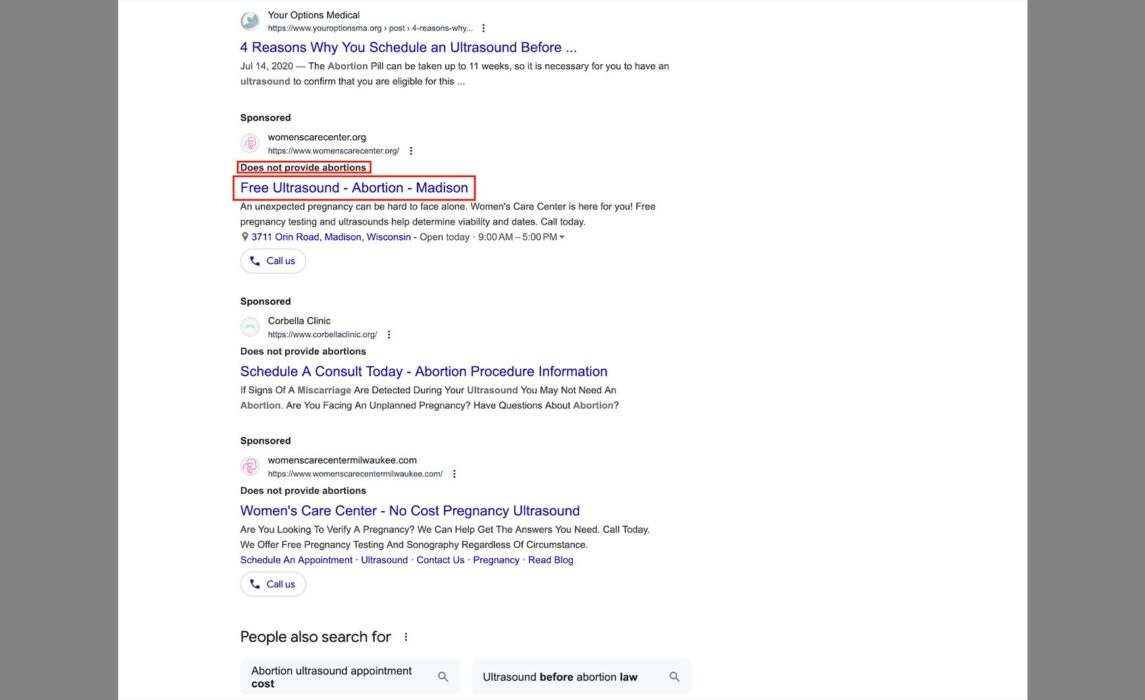Google Helps Anti-Abortion Centers Deceive Women Searching for Ultrasound Appointments
– Some states require women to have a medically-unnecessary ultrasound 24 hours before they’re permitted to have an abortion.
– These appointments must be supervised or approved by a doctor, but Google is letting non-medical “crisis pregnancy centers” (CPCs) place ads to intercept ultrasound-seekers and attempt to interfere with their medical care.
– Google is also relying on medically-unfounded CPC talking points to generate some of its top-of-page “AI Overviews” in ultrasound searches.
In states with pre-abortion ultrasound requirements, some women may turn to Google to find a provider that can help them complete this added step in the process of obtaining an abortion. But a new Campaign for Accountability (CfA) investigation found that the majority of Google search ads served to women searching for pre-abortion ultrasounds in three states that require this added step are from anti-abortion crisis pregnancy centers (CPCs), whose non-medical ultrasounds do not satisfy these states’ legal requirements.
When CfA-created Google accounts simulating 20-year-old women living in Arizona, Florida and Wisconsin searched for terms indicating that they were interested in scheduling a pre-abortion ultrasound, respectively, 64%, 56%, and 76% of the of ads Google served them were from CPCs marketing ultrasound services that would not satisfy the states’ requirements—something that neither the ads nor their destinations disclosed.
CPCs and the organizations that support them have a stated goal to persuade “abortion-minded” women to carrying their pregnancy to term and have long viewed ultrasounds as a vital persuasion tool. In many states, anti-abortion lawmakers have translated this tactic into law, mandating medically unnecessary pre-abortion ultrasounds as a way to decrease the accessibility of abortion care by imposing additional financial, logistical, and emotion burdens on patients. Some states inflict further emotional stress by forcing women to listen to compelled speech during these visits. Wisconsin, for example, requires the physician performing the ultrasound to narrate “the dimensions of the unborn child and a description of any external features and internal organs that are present.”
Recent studies make clear that ultrasounds are not medically necessary before many abortions, including medication abortion. Doctors, including the American College of Obstetricians and Gynecologists (ACOG), advocate for an end to forced ultrasound requirements, labeling them potentially “unethical and traumatic.” On top of the potential to inflict psychological harm, CPCs may deceptively intercept ultrasound seekers in order to delay medical care—something Google’s ad policy explicitly forbids. In a state like Florida, where abortion is only legal during the first six weeks of a pregnancy, even a one-day delay may shut off access to care.
In recent years, Google has endeavored to make it more difficult for CPCs to deliberately deceive abortion-seekers about the nature of their services, including by affixing in-search labels to CPC ads, search results, and map listings. Research from CfA’s Tech Transparency Project and other groups has led the company to affirm its commitment to enforcing its misrepresentation policy, which covers misleading statements in both ad text and on landing pages.
Possibly to pre-empt Google’s enforcement of this policy, a large number of Google-advertising CPCs now place disclaimers on their websites clarifying that they do not provide or refer for abortions. Despite this, Google’s current enforcement of its misrepresentation policy still allows CPCs to attempt to deceive, intercept, and delay patients seeking pre-abortion ultrasounds—a legally-required, separate appointment for tens of millions of American women seeking abortion care.
In addition to allowing and profiting from this deception in paid ads, CfA’s investigation suggests that Google may be worsening misinformation around the necessity of pre-abortion ultrasounds by relying heavily on CPC talking points to generate some of its recently introduced, top of page “AI Overviews” in search results.
Background
According to the Guttmacher Institute, there are currently six U.S. states—Arizona, Florida, Iowa, South Carolina, Wisconsin, and Wyoming—where abortion is legal during at least some period of a pregnancy, yet still require patients to undergo a forced ultrasound exam before obtaining an abortion (an additional eight states have mandatory ultrasound laws on the books, but have implemented total abortion bans in the aftermath of the Supreme Court’s 2022 Dobbs decision that render their previously enacted abortion hurdles mostly inapplicable). Importantly, all six states require that a patient’s pre-abortion ultrasound be performed either by the physician who will perform the abortion, or an entity referring to or working directly with that physician.
The medical community broadly opposes these requirements. A commentary published by the American Medical Association’s Journal of Ethics said that “forcing patients to have unwanted procedures—especially invasive procedures—or to view results against their will may in fact cause harm.” Other physicians have noted that this practice of forced ultrasounds “inappropriately limits women’s autonomy and undermines the physician-patient relationship,” and may be “traumatic” for patients.
Despite these warnings, CPCs—and anti-abortion organizations like National Institute of Family and Life Advocates (NIFLA), Heartbeat International and CareNet that support them—view ultrasounds as important persuasion tools in waging “spiritual warfare […] on the pro-life battlefield.” Heartbeat International’s “Life Trends 2024 Report” claims that 80% of women considering an abortion can be convinced to carry their pregnancy to term when shown an ultrasound. A recent large-scale analysis of CPC websites published in the Journal of the American Medical Association found that over 76% of centers advertise ultrasound services. Many of the machines that enable these services have been supplied through grant programs from outside organizations, which have worked for decades to build this number.
Although many CPCs claim association with nurses—or dress staff up in medical attire—these volunteers may not necessarily possess the professional expertise relevant to the needs of a pregnant patient. In an episode of a Heartbeat International podcast, a nurse who had just completed the organization’s ultrasound training explained that she works in an unrelated medical discipline, and that prior to the Heartbeat training “[had] not worked with patients who are pregnant in any form or fashion.”
While some CPC websites use terminology such as “limited ultrasound” or “non-diagnostic ultrasound” to describe their services, they frequently neglect to clarify the ways in which it is limited. Health experts and state officials warn that centers may use this language to “avoid oversight from medical licensing boards” and still may “provide inaccurate and misleading results.”
Google’s history with abortion misrepresentation
Google’s misrepresentation policy prohibits ad text and landing pages that “deceive users by excluding relevant product information or providing misleading information about products, services, or businesses.” For over a decade, various groups have highlighted Google’s failure to stop CPCs from violating various iterations of this policy, leading the company to roll out a series of changes for how it labels businesses that claim to provide reproductive care.
Despite early exposure of these tactics, the CPC industry has continued to view Google ads as a top tool for finding and intercepting women searching for abortions. Heartbeat International provides myriad training materials designed to teach affiliates how best to utilize Google ads to this effect. Extend Web Services, Heartbeat’s affiliated digital marketing agency, even provides direct Google Ad management services as part of its mission to aid centers in “attracting the abortion-minded client.”
In 2019, Google began adding “Does not provide abortion” labels to CPC ads in certain searches. In 2022, after the Dobbs decision brought increased attention to CPCs’ continued use of Google to intercept abortion-seekers, the company announced it would expand those labels to some abortion-related search results and Google Maps locations. Still, a CfA investigation conducted months after that change found many CPC ads marked with these labels that were still permitted to openly misrepresent their services in violation of Google’s policy. In response, Google reiterated that it would remove any ads that violate this policy.
Although Google’s past efforts to prevent CPC deception should be lauded, advertisers’ intent on delaying and diverting abortion-seekers have continued to evolve their tactics. Now, CfA’s latest investigation shows that Google’s ad review systems may not be sufficiently trained to recognize CPCs’ latest, ultrasound-specific diversion strategy as violative of their policies.
Methodology and results
Using a clean browser with no prior browsing data, researchers created new Google accounts for three hypothetical 20-year-old women residing in Jacksonville, Florida; Phoenix, Arizona; and Madison, Wisconsin. To approximate the experience of searchers in those areas, our researchers registered each Google account with a phone number whose area code corresponded to each place, and used a virtual private network (VPN) service to make it appear as if they were searching from that city.
For each location, researchers conducted searches for five keywords chosen to signal an intent to accomplish pre-abortion ultrasound requirements: “abortion ultrasound near me,” “abortion ultrasound appointment,” “schedule abortion ultrasound appointment,” “schedule pre abortion ultrasound,” and “pre abortion appointment near me.” CfA documented every ad that Google served in the first five pages of results and repeated this a total of four times for each location across four separate days.
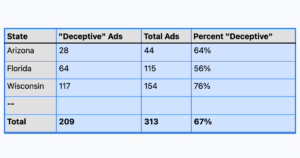
Of the 313 total ads Google served in those searches, 209 (67%) were potentially deceptive ads from CPCs. For the purposes of this experiment, CfA considers a CPC ad “deceptive” if it: 1. promotes ultrasound services on the ad’s destination page, and; 2. fails to disclose that its ultrasound would not fulfil certain legal requirements that a searcher might reasonably expect it to meet. 64% of ads served in Arizona, 56% in Florida, and 76% in Wisconsin searches met these criteria.
[Note: A CPC ad promoting its ultrasound services did not need to have physical locations in the test account’s state for CfA to consider it “deceptive.” Out of state advertisers may still be able to disrupt or delay a searcher’s plans through the omission of relevant information. In cases where a patient signals an initial intent to seek an abortion, CPC attempts at persuasion often begin from the moment contact is established—meaning a patient need not set foot inside a physical office location for harassment to begin. Dozens of CPC ads that appeared in CfA’s searches had in-search “Call Us” buttons, designed to initiate immediate contact. Many CPCs rely on national anti-abortion organizations to handle their phone intake, so it’s possible that searchers may be directed to nearby CPCs regardless of whether the original advertiser has a physical footprint in their state.]
Explicit examples of misrepresentation
Among the 209 ultrasound-promoting CPC ads, researchers documented ads in each state leading to CPC websites explicitly stating that ultrasounds were a required condition for obtaining an abortion. Some directly cited state law, while others claimed that the ultrasound requirements were imposed by telehealth abortion pill providers—all without noting that their center’s refusal to refer to any abortion providers means that an ultrasound from them could not possibly fulfill either requirement.
CfA’s Wisconsin account was served an ad for CareNet Pregnancy Center of Milwaukee. The landing page advertises the center’s free ultrasound services in multiple places, and visitors can easily navigate to its dedicated “Free Ultrasound” page for more information. On that page, the center states that “the law in Wisconsin requires that you have an ultrasound before the abortion.” The next information they give is that their ultrasounds are “completely free” and do not require insurance, but they neglect to say that their stated refusal to refer for abortions means that none of these free ultrasounds could ever be counted toward a state requirement.
Google served CfA’s Florida account multiple ads from A Woman’s Place Medical Clinic, a Heartbeat International-affiliated CPC with multiple locations throughout Florida. One of the center’s ad variants directed to a blog post titled, “Do I Really Need an Ultrasound Before Having an Abortion?” In it, the center states: “If abortion is an option you are considering, remember that Florida law requires an ultrasound exam before having an abortion procedure.” The center does not clarify anywhere on the page that the ultrasound service it advertises would not satisfy the requirements of the Florida law.
Another Florida ad with the headline “No Insurance Needed – Free Ultrasound Exam,” leads to the “Abortion Information” page for The Pregnancy Centers of Sanford and Winter Park, a Florida CPC group that does not provide nor refer for abortion services. The page explicitly tells visitors that “[m]any telehealth abortion pill providers require an ultrasound before administering abortion pills, and we can provide this service for you at no cost.” Yet, refusal to refer for abortion services suggests that it would not transmit the results of a potential ultrasound to any hypothetical telehealth abortion provider that may require it, making any inference that they can help fulfil such a requirement false.
Researchers encountered this same claim by clicking through an ad Google served to CfA’s Arizona account. When searching “abortion ultrasound near me” as the Arizona user, Google served an ad from Community Pregnancy Center in Prescott, Arizona, whose description promised “a free ultrasound to verify pregnancy viability and explore your options confidently.” The ad landing page prominently promotes their “Pre-Abortion Ultrasound” page, which contains nearly identical language to the Florida example—claiming that its free ultrasound can fulfil a hypothetical abortion pill provider’s requirement. All of these examples appear to violate Google’s misrepresentation policy.
Google AI’s spotlighting medical misinformation
In all three states, researchers documented examples of Google relying overwhelmingly on medically unsound CPC talking points to draft its top of search “AI Overviews.”
Introduced in May 2024, Google says the top of search overviews can “take the work out of searching by providing an AI-generated snapshot with key information and links to dig deeper.” Notably, the company said in its launch announcement that “the links included in AI Overviews get more clicks than if the page had appeared as a traditional web listing for that query.” Although Google acknowledges that AI Overviews “can and will make mistakes” it notes that the summaries are “a core Google feature” that “can’t be turned off.”
In CfA’s tests, the query “schedule pre abortion ultrasound,” yielded a similar Google AI Overview in each of the three locations. The AI-generated top-of-search summary for all three locations yielded minor differences, but all three cited myriad CPC websites to advise on why pre-abortion ultrasounds help women make “informed” decisions. In the Florida result, Google’s AI overview even made specific recommendations for where the searcher could schedule her pre abortion ultrasound, including at Thrive Orlando—a crisis pregnancy center that does not perform nor refer out for abortion services. Like other CPCs, Thrive Orlando’s Ultrasound page states that Florida law requires an ultrasound, but fails to note that one from them would not count toward that requirement.
After noting the consistency of this AI Overview result across all instances of this query, researchers conducted the search again in a logged-out clean browser and documented every source that Google relied on to generate the answer. The first five (1, 2, 3, 4, 5) linked to various CPC websites, some of which describe pre-abortion ultrasounds as “crucial” and “life-saving.” The sixth linked to an article from the American Medical Association’s Journal of Ethics, which says that forced ultrasounds are “not medically necessary and can add to the cost of the abortion procedure,” yet this fact did not make it into Google’s AI Overview.
One common CPC talking point that Google’s AI Overview presented to searchers was the idea that pre-abortion ultrasounds are important in order to rule out an ectopic pregnancy—a pregnancy in which a fertilized egg is implanted outside of the uterus. Many CPCs, including several mentioned previously in this report, prominently spotlight the dangers of ectopic pregnancies in their ultrasound pages as a means to scare women into scheduling an appointment. In “schedule pre abortion ultrasound” searches for all three locations, the first source cited in Google’s AI Overview was a blog post from Metro Women’s Center, a Heartbeat-affiliated CPC in Minnesota. The page states that ectopic pregnancies may result in “life-threatening blood loss,” and cannot be terminated by abortion pills—implying that women should fear for their lives, that services from a CPC can alleviate that fear, and that services from an abortion provider cannot.
While untreated ectopic pregnancies can indeed be life-threatening, CPCs may improperly suggest that their volunteers are qualified to diagnose them. Earlier this year, The Assembly published an account of a false positive ectopic pregnancy diagnosis, given by an apparently unqualified CPC ultrasound technician, which caused a North Carolina woman to incur “hours of emotional turmoil and a $6,250 ER bill.” And, in 2023, a woman in Massachusetts sued a CPC that failed to spot her ectopic pregnancy, alleging that the center “misleads patients […] that it will perform ultrasounds to determine the viability of intrauterine pregnancy. These statements are false, as the ultrasounds performed do not meet standard levels of medical care […]”
Other notable findings
CfA also encountered multiple CPC ads that failed to carry an in-search “Does not provide abortions” label, which Google policy insists ads in abortion related searches must carry—a policy that has been in place since 2019.
When CfA’s Arizona account searched the keyword “schedule abortion ultrasound appointment,” Google served an ad for Pregnancy Care Center of Chandler, an Arizona CPC, which did not have a label. Similarly, researchers searching for “abortion ultrasound near me” using the Wisconsin account received an unlabeled ad for Women’s Care Center, a CPC in Madison, Wisconsin. The ad headline said “Abortion – Madison – Walk ins Welcome,” suggesting an intent to deceive searchers about the nature of Women Care Center’s services—the very behavior the labels are meant to counter.
When Google was questioned by Bloomberg News and the Center for Countering Digital Hate in 2022 for failing to label many anti-abortion center ads in abortion related searches, a company spokesperson attempted to explain away some of the missing labels by saying that ads aimed at “more general queries” do not show the labels. Given the specificity of CfA’s search terms, and the presence of appropriate labels on other CPC ads in the same queries, these findings appear to be the result of an enforcement failure, not a “general query” loophole in Google’s stated policy.
CfA also identified ads in each state that, despite being tagged with the “Does not provide abortions” label, were allowed to explicitly misrepresent their services in the ad’s headline, in apparent violation of its misrepresentation policy. These included multiple ads from Prestonwood Pregnancy Center. Although Prestonwood is a CPC that states on select areas of its website that it does not refer for nor perform abortion services, one Prestonwood ad served in CfA’s Arizona searches was permitted to advertise a “Free Abortion Pill” in the headline. Several others claimed in the ad headline that Prestonwood was an “Abortion Center.”
These findings echo a 2022 investigation by CfA’s Tech Transparency Project, which found Prestonwood among a number of CPCs falsely representing its abortion-related offerings in Google ad headlines. When reporters with Bloomberg asked both Google and Prestonwood about an ad claiming to offer a “Free Abortion Pill,” both parties pointed fingers at the other. Regardless of whether Prestonwood continues to intentionally misrepresent its offerings, or Google is indeed suggesting the headlines itself, CfA’s latest findings show that Google’s failure to fully enforce its misrepresentation policies even around core abortion services persists over two years later.
Conclusion
CfA’s investigation demonstrates how crisis pregnancy centers continue to use Google as a key part of their strategy to deceive and intercept “abortion-minded” women. While Google has made efforts to clarify which advertisers do and do not provide abortions, the company’s blind spot around searches for often legally required ultrasounds leading up to those appointments leaves many searchers still open to predation.
The market conditions that have enabled this deception are no accident. Anti-abortion lawmakers, religious nonprofits, and non-medical pregnancy centers have worked in tandem to artificially create the demand for this pre-abortion service category, while relying on Google to funnel searchers in their direction. Meanwhile, the company continues to profit to the tune of millions of dollars from these centers—raising questions about how much policy enforcement is truly in Google’s best interest.
Google says that it relies on a “combination of Google AI and human evaluation to ensure that ads comply with [its] policies.” Whether it will require additional training of AI systems, human reviewers, or both, Google must evolve its policy response to keep pace with unethical advertisers who are intent on finding new ways to intercept abortion seekers—no matter where they are in the process. This may include—as Google has done in the past—requiring additional in-search labels or on-page disclaimers explaining the limitations of a CPC’s ultrasound services so that there may be no confusion around the medical and legal deficiencies of CPC-supplied ultrasounds.
